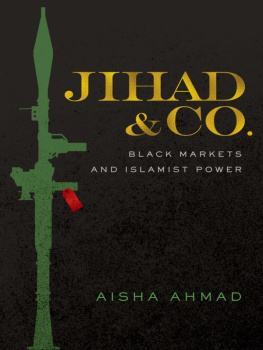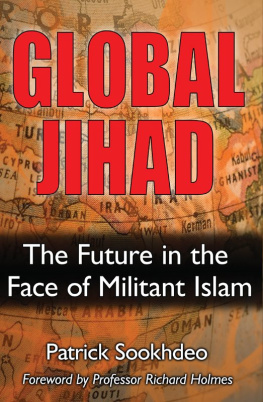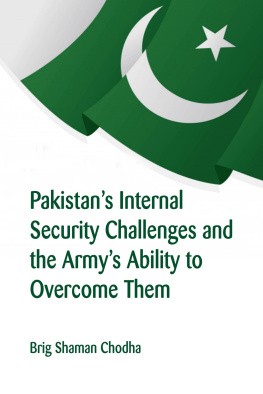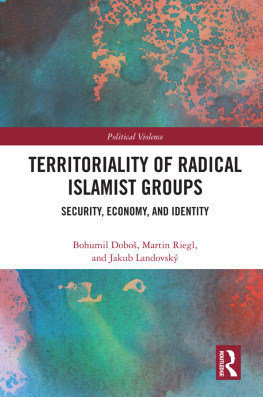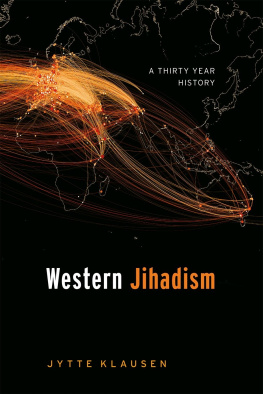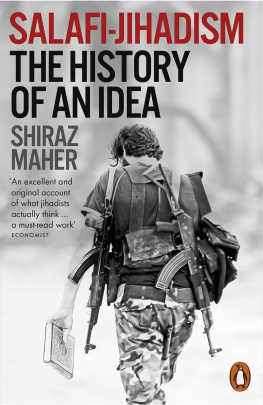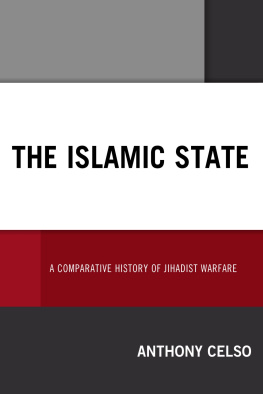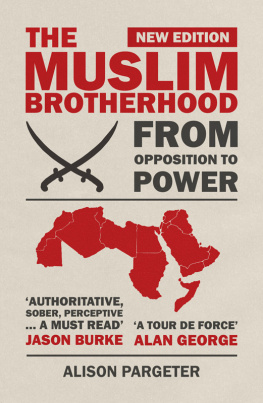Jihad & Co.

Oxford University Press is a department of the University of Oxford. It furthers the Universitys objective of excellence in research, scholarship, and education by publishing worldwide. Oxford is a registered trade mark of Oxford University Press in the UK and certain other countries.
Published in the United States of America by Oxford University Press
198 Madison Avenue, New York, NY 10016, United States of America.
Oxford University Press 2017
All rights reserved. No part of this publication may be reproduced, stored in a retrieval system, or transmitted, in any form or by any means, without the prior permission in writing of Oxford University Press, or as expressly permitted by law, by license, or under terms agreed with the appropriate reproduction rights organization. Inquiries concerning reproduction outside the scope of the above should be sent to the Rights Department, Oxford University Press, at the address above.
You must not circulate this work in any other form and you must impose this same condition on any acquirer.
CIP data is on file at the Library of Congress
ISBN 9780190656775
eISBN 9780190656799
For Baba
Contents
IN THE MANY years devoted to making this book, I have incurred an enormous debt of gratitude. This manuscript is the end result of a collective global effort: from the fieldwork to the final revisions, I was blessed to inherit the experiences and insights of countless people who invested in the telling of this story. They are the heart of this book and its most beautiful features. Its flaws and failings are mine alone.
At its core, this work would not have been possible without my extraordinary colleagues overseas. In Afghanistan, I received immense support from Gul Mohammad Gulzai, Ahmad Jan Nawzadi, and Nasir Ahmad Nawidy. I was also fortunate to learn from several former members of the original Taliban movement. I am especially grateful to Mullah Abdul Salam Zaeef, who not only kindly shared his experiences with me but also critically reviewed my argument for accuracy. I am deeply touched that Mullah Wakil Ahmed Mutawakkil made the time, while recovering from illness, to clarify the empirical details of important historical events of the Taliban era. I am also greatly indebted to Sayed Rahmatullah Hashemi for making line-by-line scholarly comments on my Afghanistan chapters, based on his incredible insiders knowledge of the early Taliban government. I am honored by their generosity.
In Pakistan, I give special thanks to the former commissioners of Afghan refugees Abdullah Sahib and Rustam Shah Mohmand, as well as Khalid Rahman and his outstanding team at the Institute for Policy Studies in Islamabad, who organized workshops, focus groups, and seminars in support of my research. I also thank Professor Adnan Sarwar Khan and Professor Qibla Ayaz of the University of Peshawar; Professor Khan Bahadar Marwat of the Agricultural University, Peshawar; Professor Rasul Bakhsh Rais of the Lahore University of Management Sciences; and Asif Gul and Sohail Ahmad for their research assistance. I am grateful to several members of the Pakistani military and intelligence communities, including Lieutenant General Asad Durrani and General Ali Jan Aurakzai for their candid accounts of Pakistans involvement in Afghanistan, and to the late Director-General Hamid Gul for his unparalleled insights. My prayers and thanks also go to the late Colonel Imam, who spent countless hours telling me his stories of the Afghan jihad and the Taliban.
For my Somalia research, I was fortunate to have equally outstanding colleagues. I am deeply indebted to Professor Yahya H. Ibrahim of Mogadishu University, who provided me with a no-holds-barred education on the economics of state failure. I am grateful to Dr. Ibrahim Farah of the University of Nairobi, who trained me in field methods, traveled with me to the unruly Somali border regions, and led the survey team in Eastleigh, composed of three outstanding research assistants: Jabril Warsame, Sagal Jama, and Abdikadir Mohamoud. I thank Jabril Abdulle from the Center for Research and DialogueSomalia for his support of the survey work and for many hours of constructive discussions on Somali politics. I extend my gratitude to Matt Bryden for his invaluable insights on clan networks and insurgency, Sahal Abdulle for his support of my field research in southern Somalia, and Liban Cashuur for facilitating my meetings in Somaliland. My dear friend Shelley Saywell generously shared her raw documentary film footage with me so that I could better bring my reader into remote Somali communities. I also express my deepest appreciation to Dr. Hawa Abdi and Dr. Deqo Mohamed for taking time away from their extraordinary, life-saving humanitarian work in the Afgooye corridor to assist with this academic research.
My excellent colleagues also facilitated my meetings in both Lebanon and Mali. I thank Gry Synnevg and Soumaila Guindo for their tremendous assistance in Bamako, and thanks also to Amir Abdul Reda for his energetic work in arranging my meetings in Beirut and the Beqaa Valley. To those colleagues around the world who assisted me in the field but requested anonymity, thank you for your kindness and hospitality.
In making this book, I gratefully acknowledge the generous financial support from the Norwegian Research Council, which supported both my fieldwork and writing process. Furthermore, because I began this work as a doctoral candidate, I also acknowledge the support I received for my dissertation from the Canadian Social Sciences and Humanities Research Council, the Security and Defence Forum of the Canadian Department of National Defence, the Canadian International Development Research Centre, the Center on International Cooperation at New York University, and the Horowitz Foundation for Social Policy.
Throughout the writing stage, I benefited from the sharp insights of Steve Saideman, David Welch, and Stuart Soroka. I wrote the first draft as a fellow at the Belfer Center for Science and International Affairs at the Harvard Kennedy School, where I received helpful feedback from Steven Miller, Sean Lynn-Jones, Monica Duffy Toft, Kelly Greenhill, Annie Tracy Samuel, Joshua Shifrinson, Peter Krause, Sarah Bush, Michael Beckley, Ahsan Butt, and Melissa Willard-Foster. My colleagues Daniel Douek, Theodore McLauchlin, and Christopher Anzalone also offered very useful comments. My department at the University of Toronto then generously funded a book manuscript workshop for me, where I received helpful advice from Ed Schatz, Lucan Ahmad Way, Louis Pauly, Antoinette Handley, Jacques Bertrand, Matthew Hoffmann, Paul Kingston, and Stathis Kalyvas. Roger Hayden provided wonderful comments on an earlier draft, which made the writing significantly better.
In revising the penultimate version, I was fortunate to receive razor-sharp critical feedback from Barnett Rubin, Peter Andreas, Will Reno, and Stig Jarle Hansen. My research assistants were essential at this stage: Ajmal Burhanzoi blessed the final draft with his phenomenal insights from Afghanistan; Swilai Burhan and Sahra Togone assisted with translation of documents in multiple languages; Fazan Baig and Zabikhulla Yari reviewed the text and footnotes for clarity; and Christopher David LaRoche and Lucas Ria proofread the final draft. In bringing the project to completion, I am profoundly grateful to my editor David McBride and the fantastic production team at Oxford University Press for their meticulous line-by-line comments, enthusiasm for my research, and commitment to sharing these stories with the world.

